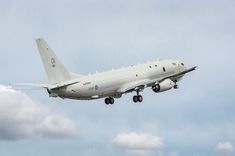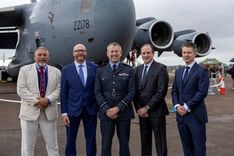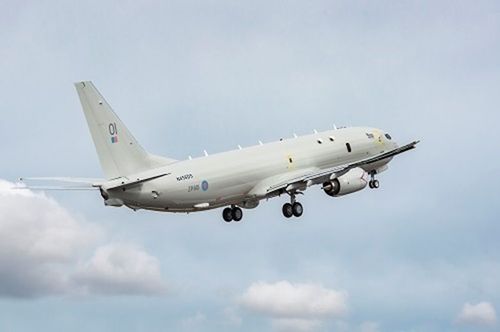Boeing provides guidance on SAF usage for defense aircraft



All Boeing-built military aircraft, such as the P-8A Poseidon operating by the Royal Air Force, can fly on sustainable aviation fuel (SAF) at currently approved limits. / SOURCE: Boeing
July 23, 2024
BY Boeing
Boeing has released guidance to defense customers that company-built military aircraft can operate on sustainable aviation fuel (SAF) at currently approved limits of up to 50% blend with conventional fuel. The guidance, announced on July 20 at RIAT, aims to support global militaries who are evaluating the adoption of SAF into their fleets.
The global No Technical Objection (NTO) states there are no technical issues with Boeing defense aircraft operating on synthetic aviation turbine fuels, which includes SAF. The NTO applies to all Boeing-built defense aircraft and their derivatives.
“SAF is widely accepted today as a drop-in replacement that works with existing aircraft, and also provides opportunities for global interoperability as well as strategic resilience through local fuel production,” said Steve Parker, senior vice president and chief operating officer at Boeing Defense, Space and Security. “We hope this NTO will clear the way for more widespread SAF adoption by our military customers and propel greater alignment between commercial and military fuel standards, to the benefit of all.”
Unblended, or “neat” SAF, which is totally free of fossil fuels, can reduce lifecycle carbon emissions up to 84% when compared to conventional jet fuel and offers the industry’s largest potential to reduce carbon emissions over the next 30 years in all aviation segments.
Advertisement
Currently, the maximum allowable limits for SAF is a 50-50 blend with conventional fossil fuels.
“Boeing’s announcement at RIAT that all their military aircraft can operate on a 50% blend of SAF is a welcome step in the more widespread adoption of SAF by air forces around the world,” said Air Vice-Marshal Shaun Harris, Royal Air Force, Director Support. “As a result of previous work in 2020, the RAF cleared all of its military aircraft for 50% SAF. We have continued to be at the forefront of trailing the use of SAF with the data we have gathered informing the MoD’s Defence Aviation Net Zero Strategy.”
He added: “As well as contributing to a reduction in carbon emissions, more widespread adoption of SAF amongst our allies will enhance global interoperability, maintaining our ability to operate anywhere that the RAF is required.”
Synthetic aviation turbine fuels are produced through alternative processes from sources other than petroleum. SAF is one category of synthetic fuels and uses recycled carbon from renewable materials like waste oils, municipal solid waste and plant residues.
Advertisement
“All NATO Allies are committed to ensuring secure, resilient, and sustainable energy supplies, including fuel, to Allied military forces,” said James Appathurai, NATO's Deputy Assistant Secretary General for Innovation, Hybrid and Cyber. “SAF will play a key role in the Alliance’s efforts to adapt to the ongoing energy transition while maintaining its military capability, effectiveness, and interoperability. NATO and industry's readiness to increase the uptake of SAF is an important step in this direction.”
SAF is a fully approved fuel source that is fully interchangeable with conventional fuels such as Jet A or Jet A-1. Additionally, multiple SAFs have been incorporated into military fuels specifications, such as JP-8/NATO F-34 or JP-5/NATO F-44.
“Qualifying synthetic aviation turbine fuels, which includes SAF, expands the DOD’s operational capacity and is an important part of Navy readiness,” said Rick Kamin, Operational Energy Manager for the Naval Air Systems Command and lead for the Tri-Service Petroleum, Oil, and Lubricants Users Group’s synthetic aviation turbine fuels qualification team. “The global NTO helps expedite the DOD’s approval of synthetic aviation turbine fuels critical to assuring worldwide interoperability.”
Boeing has been a pioneer in making SAF a reality and has a long track record with advancing alternative fuels. In 2010, the company collaborated with the U.S. Air Force on an in-depth fuel study as part of their efforts to certify the C-17 Globemaster to use SAF blends. The same year, Boeing also supported the supersonic flight of a U.S. Navy F/A-18F “Green Hornet” on a 50/50 SAF blend.
Related Stories
President Trump on July 4 signed the “One Big Beautiful Bill Act.” The legislation extends and updates the 45Z credit and revives a tax credit benefiting small biodiesel producers but repeals several other bioenergy-related tax incentives.
SAF Magazine and the Commercial Aviation Alternative Fuels Initiative announced the preliminary agenda for the North American SAF Conference and Expo, being held Sept. 22-24 at the Minneapolis Convention Center in Minneapolis, Minnesota.
Saipem has been awarded an EPC contract by Enilive for the expansion of the company’s biorefinery in Porto Marghera, near Venice. The project will boost total nameplate capacity and enable the production of SAF.
Global digital shipbuilder Incat Crowther announced on June 11 the company has been commissioned by Los Angeles operator Catalina Express to design a new low-emission, renewable diesel-powered passenger ferry.
International Air Transport Association has announced the release of the Sustainable Aviation Fuel (SAF) Matchmaker platform, to facilitate SAF procurement between airlines and SAF producers by matching requests for SAF supply with offers.
Upcoming Events










